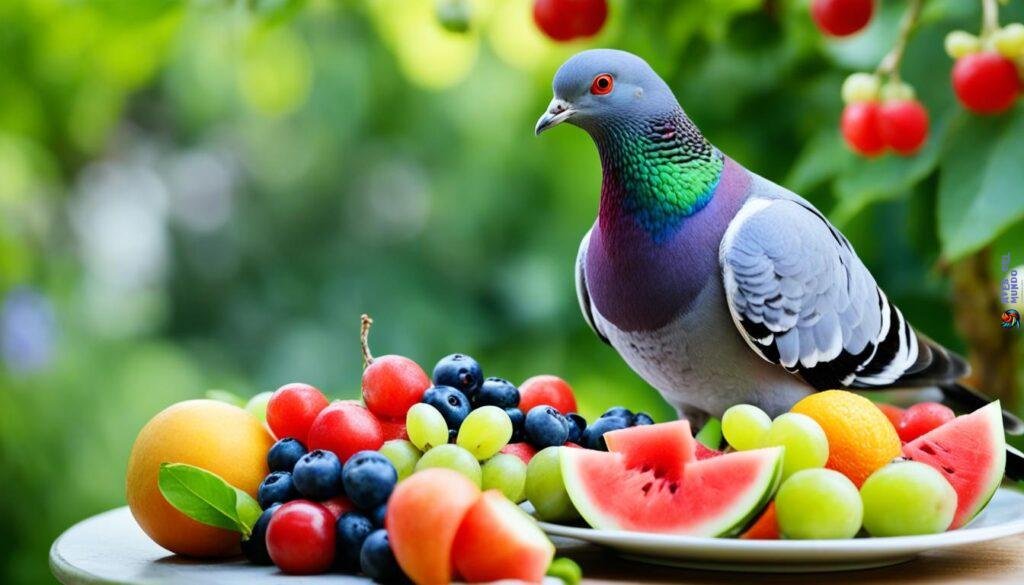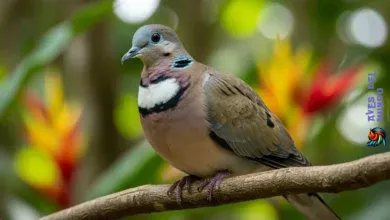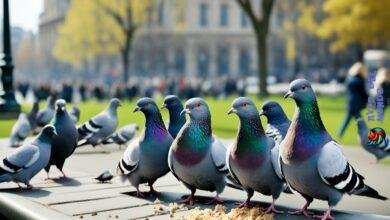Pigeons, known for city living, often eat seeds and crumbs. But, they can enjoy fruits too. What fruit can pigeons eat? Though not common in their diet, fruits offer them vital nutrients. Pigeons have diverse tastes and can eat small fruit pieces.
Thinking about a pigeon fruit diet? It’s not just about giving them any fruit. They need small, easy-to-eat pieces. Adding safe fruits for pigeons provides variety and vitamins to their diet.
Adding fruit to their diet is a kind and nutritious act. Learn how it can enhance their meals in the city.
Understanding Pigeon Dietary Needs and Preferences
Learning about pigeon nutrition fruits is key. Many think all birds eat the same, but that’s not true. Pigeons prefer seeds and grains because of their small beaks. These beaks let them pick and eat small items well. They might not handle large food like fruits easily.
Feeding pigeons fruits means adding nutrient-rich foods to their diet carefully. If you want to feed your pigeon best fruits for pet pigeons, do so in moderation. Chop fruits into fine pieces to make them easier for pigeons to eat. This way, they get natural sugars and vitamins in a form they can digest.
Wood pigeons might eat fruits naturally, but most city pigeons don’t. Introducing fruits needs patience. It allows pigeons to get used to them as part of their meals.
| Fruit Type | Benefit | Serving Suggestion |
|---|---|---|
| Blueberries | High in antioxidants | Whole or halved |
| Banana | Potassium-rich | Sliced thinly |
| Apple | Vitamin C and fiber (seeds removed) | Chopped finely |
| Cherries | Vitamin C and A | Pitted and quartered |
It’s important to also give them leafy greens, chopped for easy eating. Adding various fruits to their regular seeds can boost their health and happiness.
Adding fruits to a pigeon’s diet benefits their nutrition and is enjoyable. Feeding fruits, whether to many pigeons or just one, greatly improves their quality of life.
The Surprising Truth About Pigeons and Fruits
As caregivers of pigeons start to vary their pet’s meals, they often think about healthy fruits for pigeons. Some pigeons might not be keen on trying fruits at first. Others may love it right away. This is because pigeons, just like us, have their own likes and dislikes that come from their past. For pigeons unsure about fruits,
giving them pigeon-friendly fruits is similar to getting a kid to eat a new veggie.
You can make fruits more appealing by cutting them into tiny pieces. This makes the birds curious and willing to try.
When adding nutritious fruits for pigeons to their diet, aim for a variety that’s safe and tasty for them. Here’s a list of fruits to help you choose:
| Fruit | Benefits | Serving Suggestion |
|---|---|---|
| Apples (without seeds) | Rich in fiber and vitamins | Diced finely |
| Berries | High in antioxidants | Whole or halved |
| Grapes | Potassium and vitamin K | Halved to prevent choking |
| Pears | Vitamin C and fiber | Sliced into small pieces |
| Bananas | Magnesium and vitamin B6 | Mashed or chopped finely |
Fruits are a great addition to a pigeon’s diet but remember, they should just be a part of it. Watching your pigeons can show you which fruits they love. This makes offering healthy fruits for pigeons really rewarding.

What fruit can pigeons eat?
Are you taking care of pigeons? You might be wondering about the fruits suitable for pigeons. It’s important to feed them only what’s good for their health. Although pigeons might not naturally go for fruits, you can get them to try different ones with a bit of help.
Learning about what fruit can pigeons eat means knowing which ones are safe and which to avoid. For example, never give them avocados since they’re toxic to birds. Instead, choose fruits that are healthy and safe for them.
| Fruit | Benefits for Pigeons | Serving Suggestion |
|---|---|---|
| Berries (strawberries, blueberries) | Rich in antioxidants and vitamins | Whole or halved, depending on size |
| Apple (without seeds) | Source of fiber and vitamin C | Cut into small, manageable pieces |
| Pear | Low in calories, high in water content | Chopped into tiny pieces |
| Grapes | Contain vitamins A, C, and B6 | Whole or cut in half |
| Banana | Potassium for muscle and blood vessel function | Sliced thinly |
| Peach | Good source of vitamins A and C | Skin removed and diced |
| Cherries | Rich in antioxidants and vitamins | Pitted and halved |
| Melon (watermelon, cantaloupe) | Hydrating with high water content | Seeds removed and cut into small bits |
Fruits are great for pigeons but should only be a part of what they eat. Always start with a little at a time. This helps you see what they like and keeps their meals varied and healthy.
Incorporating Fruits into a Pigeon’s Diet: Best Practices
Adding fruits to a pigeon’s meal plan needs careful planning. To keep them healthy, it’s crucial to follow best practices for feeding pigeons fruits. Doing so adds exciting nutrients to their diet, essential for city-living birds.
Preparation and Presentation of Fruits for Pigeons
Begin by choosing fresh fruits and washing them well to remove pesticides. Chop the fruits into small pieces. This prevents the risk of choking and makes it easy for pigeons to eat.
It’s best to place fruits in a separate dish from their main food. This helps avoid picky eating habits. It encourages pigeons to try and enjoy the fruits as a new addition to their meals.

Understanding the Role of Variety and Moderation
Offering a variety of fruits keeps pigeons healthy and interested in their food. Yet, it’s important to limit how much they eat. Fruits should be a treat, not the main part of their diet, to keep meals balanced.
| Fruit | Benefits | Frequency |
|---|---|---|
| Grapes | Antioxidants and vitamins | 2-3 times per week |
| Blueberries | High in Vitamin C and K | 2 times per week |
| Apples (minus seeds) | Fiber and Vitamin A | 1-2 slices occasionally |
| Cherries | Vitamins A and E | Seasonal availability |
Following the best practices for feeding pigeons fruits means balancing variety and moderation. These guidelines cater to their nutritional needs and natural behaviors. This promotes wellbeing for your pigeons.
Safe Fruits for Pigeons: A Comprehensive List
When deciding what fruit pigeons can eat, choose ones that are tasty and safe. Pigeons have special dietary needs. A good list of safe fruits for pigeons helps avoid health problems and gives them a varied diet.
- Grapes (seedless)
- Blueberries
- Mulberries
- Apples (cored and seeds removed)
Pigeons like these fruits because they’re soft and the right size when cut. But, it’s important to take out any seeds or pits. Apple seeds are dangerous because they have cyanide.
| Fruit | Preparation Notes | Bird-Friendly Serving Tips |
|---|---|---|
| Grapes | Seedless variety, washed | Whole or halved depending on pigeon size |
| Blueberries | Fresh and unprocessed, washed | Can be offered whole due to small size |
| Mulberries | Fresh, ensure no stems, washed | Whole or mashed if preferred |
| Apples | Cored, seeds removed, washed thoroughly | Chopped into small, bite-sized pieces |
Don’t feed your pigeons avocados, as they can be harmful. Balance is key in their diet. Offer grains, seeds, and some of the fruits listed above. This list of safe fruits for pigeons will help keep your birds healthy and happy.
Why Some Fruits Are Off-Limits for Pigeons
Understanding which fruits are safe is vital for pigeon caretakers. Many fruits are beneficial, but some are dangerous. Toxic fruits for pigeons contain substances harmful to them. For example, avocados have persin, deadly to pigeons. It harms their heart and can be fatal.
Apple seeds also pose a risk. The apple flesh is healthy, but the seeds contain cyanide, a toxin. If pigeons eat too many seeds, they could be in danger. Make sure apples for pigeons have no seeds or core.
Foods high in sugar, salt, alcohol, caffeine, or chocolate are unsafe fruits for pigeons. These can upset a pigeon’s health. When treating pigeons, choose carefully and offer fruits in moderation for their safety.
| Fruit or Substance | Specific Element | Impact on Pigeons |
|---|---|---|
| Avocado | Persin | Can cause heart problems, respiratory distress, and in severe cases, death. |
| Apples (Seeds) | Cyanide | Can interfere with oxygen distribution in the blood, leading to potential risk if consumed in large amounts. |
| Chocolate | Theobromine | Stimulates the nervous system and heart of pigeons, which can be toxic and lead to fatal conditions. |
| High Sugar Fruits | Sucrose, Fructose | Can lead to obesity and an imbalance in nutrient intake, potentially resulting in health issues over time. |
In conclusion, adding variety to a pigeon’s diet is good but avoid toxic fruits for pigeons and other unsafe fruits. By learning about these risks and choosing safe foods, we can help our pigeons live happily and healthily.
The Health Benefits of Feeding Pigeons Fruits
Adding fruits to a pigeon’s diet does wonders for their health and taste buds. Health benefits of fruits for pigeons are significant. Fruits bring them vital vitamins, enhancing their overall diet. Let’s explore how fruits can improve pigeons’ wellbeing.
Fruits loaded with antioxidants can majorly uplift a pigeon’s health. These antioxidants shield pigeons from environmental harm and strengthen their immune system. Fruits also aid in keeping their feathers bright and healthy.
| Fruit | Key Nutrients | Benefits for Pigeons |
|---|---|---|
| Blueberries | Vitamins C and K, Manganese | Immune support, improved feather quality |
| Apples (without seeds) | Vitamin C, Dietary Fiber | Digestive health, disease prevention |
| Grapes | Vitamin C, Vitamin K | Antioxidants support, energy provision |
| Bananas | Potassium, Vitamin B6 | Muscle function, hormone production |
However, fruits should only be a treat, not the main part of a pigeon’s diet. Even a small amount of health benefits of fruits for pigeons can greatly enhance their health and energy. Remember, balance is essential in a nutritious pigeon diet.
- Ensure fruits are fresh and free of pesticides.
- Introduce new fruits slowly and in small quantities.
- Observe how the pigeon responds to different types of fruits.
By adding fruits to their diet, you’ll see pigeons thrive. Their lively flights and shiny feathers are signs of their great health and joy.
Fruits in the Wild Pigeon Diet: An Insight
Wild pigeons eat a variety of foods, different from city pigeons. City pigeons often eat what people leave behind. But wild ones look for seeds, grains, and lots of fruits in their area. Learning about a wild pigeon’s diet helps us feed them better, no matter where they are.
Common Fruit Consumption Behaviors in Wild Pigeons
Wild pigeons are good at finding berries and small fruits. This is a big part of what they eat. The fruits give them important vitamins and keep their diet balanced. They can find fruits everywhere, from low bushes to high tree branches. Knowing how they find and eat their food helps us understand how they stay healthy on their own.
Comparing the Diets of Urban vs. Wild Pigeons
City pigeons and wild pigeons eat very differently because of where they live. City pigeons often eat processed foods, which aren’t always healthy. This can lead to them not getting enough nutrients. On the other hand, wild pigeons eat fruits and other natural foods. This keeps their diet healthy. If we know what wild pigeons eat, we can feed city pigeons better. This will help them be healthier and live longer.



